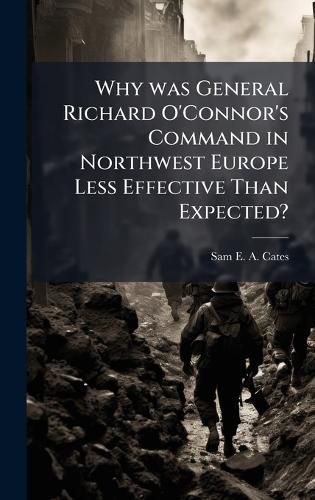Readings Newsletter
Become a Readings Member to make your shopping experience even easier.
Sign in or sign up for free!
You’re not far away from qualifying for FREE standard shipping within Australia
You’ve qualified for FREE standard shipping within Australia
The cart is loading…






General Richard O'Connor was the British VIII Corps commander in Normandy 1944. Previously he forged an outstanding reputation as a large unit commander in the desert of North Africa and this form suggests his command in Northwest Europe would be faultless. However, this was not the case. Some historians explain his pedestrian performance in Normandy by pointing to his two and a half years as a prisoner of war in Italy. This monograph challenges this narrative suggesting instead that O'Connor's command style was not suited to the context of war in Normandy. General O'Connor had a wealth of relevant military experience. The crucible of World War and his experiences commanding the Western Desert Force in North Africa created in him a style of command that was best suited to independent operations, on ground that facilitated effective maneuver, and with conditions that enable the achievement of the element of surprise. Yet in Normandy 1944, the context in which General O'Connor commanded did not allow for any of these conditions. Rather, a constrictive chain of command, narrow fronts, restrictive terrain, and the difficulty of achieving surprise all combined to provide a context in which General O'Connor was a less effective corps commander than expected.
This work has been selected by scholars as being culturally important, and is part of the knowledge base of civilization as we know it. This work was reproduced from the original artifact, and remains as true to the original work as possible. Therefore, you will see the original copyright references, library stamps (as most of these works have been housed in our most important libraries around the world), and other notations in the work.
This work is in the public domain in the United States of America, and possibly other nations. Within the United States, you may freely copy and distribute this work, as no entity (individual or corporate) has a copyright on the body of the work.
As a reproduction of a historical artifact, this work may contain missing or blurred pages, poor pictures, errant marks, etc. Scholars believe, and we concur, that this work is important enough to be preserved, reproduced, and made generally available to the public. We appreciate your support of the preservation process, and thank you for being an important part of keeping this knowledge alive and relevant.
$9.00 standard shipping within Australia
FREE standard shipping within Australia for orders over $100.00
Express & International shipping calculated at checkout
Stock availability can be subject to change without notice. We recommend calling the shop or contacting our online team to check availability of low stock items. Please see our Shopping Online page for more details.
General Richard O'Connor was the British VIII Corps commander in Normandy 1944. Previously he forged an outstanding reputation as a large unit commander in the desert of North Africa and this form suggests his command in Northwest Europe would be faultless. However, this was not the case. Some historians explain his pedestrian performance in Normandy by pointing to his two and a half years as a prisoner of war in Italy. This monograph challenges this narrative suggesting instead that O'Connor's command style was not suited to the context of war in Normandy. General O'Connor had a wealth of relevant military experience. The crucible of World War and his experiences commanding the Western Desert Force in North Africa created in him a style of command that was best suited to independent operations, on ground that facilitated effective maneuver, and with conditions that enable the achievement of the element of surprise. Yet in Normandy 1944, the context in which General O'Connor commanded did not allow for any of these conditions. Rather, a constrictive chain of command, narrow fronts, restrictive terrain, and the difficulty of achieving surprise all combined to provide a context in which General O'Connor was a less effective corps commander than expected.
This work has been selected by scholars as being culturally important, and is part of the knowledge base of civilization as we know it. This work was reproduced from the original artifact, and remains as true to the original work as possible. Therefore, you will see the original copyright references, library stamps (as most of these works have been housed in our most important libraries around the world), and other notations in the work.
This work is in the public domain in the United States of America, and possibly other nations. Within the United States, you may freely copy and distribute this work, as no entity (individual or corporate) has a copyright on the body of the work.
As a reproduction of a historical artifact, this work may contain missing or blurred pages, poor pictures, errant marks, etc. Scholars believe, and we concur, that this work is important enough to be preserved, reproduced, and made generally available to the public. We appreciate your support of the preservation process, and thank you for being an important part of keeping this knowledge alive and relevant.